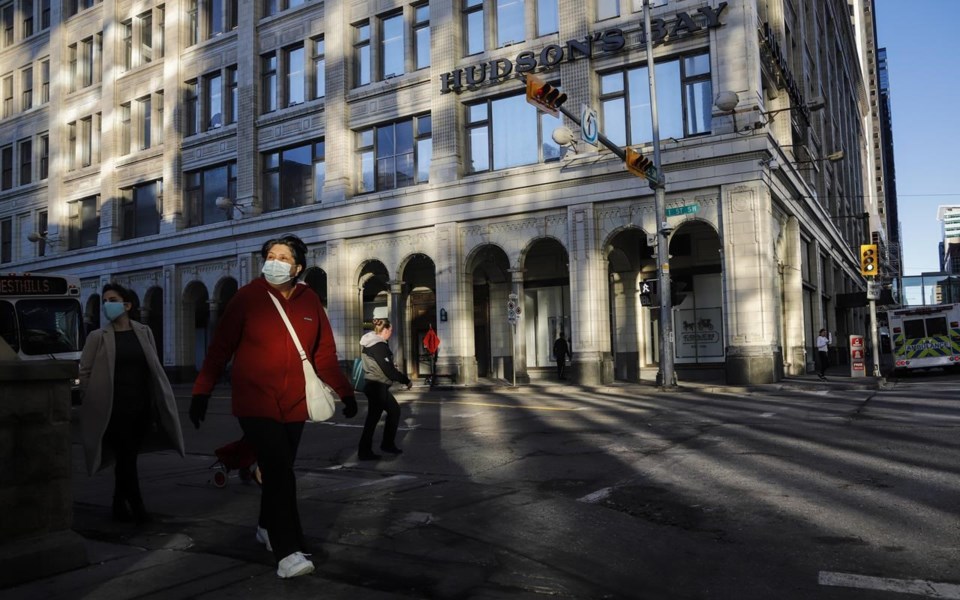EDMONTON — Alberta expects to receive 680,000 doses of COVID-19 vaccine early in the new year, but there are still hurdles and unknowns, says the province's chief medical health officer.
“These (vaccine) numbers, of course, depend on many factors,” Dr. Deena Hinshaw told reporters Wednesday.
“They depend on the final pieces of the trials that are underway going well. They depend on ensuring that the safety and the effectiveness of the early vaccines can be assured.
“All of those checks and balances must be cleared.”
She said Alberta, with a population of about 4.4 million, would receive 465,000 does of the Pfizer Inc. vaccine and 221,000 doses of the Moderna one.
In recent days, both Pfizer and Moderna have said their vaccines are about 95 per cent effective in trials. They still must undergo regulatory review and approval.
The doses would be distributed on a per-capita basis. Ontario Health Minster Christine Elliott said her province expects to get 1.6 million combined doses between January and March.
Alberta continues to deal with high daily cases numbers, putting strain on contact tracing and the health system.
The province reported 730 new infections Wednesday, with 287 people in hospital and 57 of them in intensive care. There were 11 new deaths, bringing that total to 443. There are 10,057 total active cases.
Hinshaw said the strain on contact tracing continues, with about 40 per cent of cases linked to a household or social gathering or private events.
Ten per cent are linked to continuing care centres, four per cent to schools and child care centres and three per cent to outbreaks at acute care facilities such as hospitals.
“For 30 per cent (of cases), the source remains unknown,” she said.
In response, the province imposed new measures late last week.
There is a 15-person limit on public gatherings and informal events in high-risk areas, which include urban centres and communities surrounding Edmonton and Calgary.
Bars, pubs and restaurants that serve liquor must stop serving by 10 p.m. and close an hour after that to prevent those establishments from becoming late night super-spreader party zones.
In Edmonton, Calgary and other major cities, indoor recreation and team sports, fitness classes and amateur performing arts groups are also banned.
The province is to review the success of those measures on Nov. 27, but Hinshaw said she is distressed to hear stories of some fitness groups and sports teams trying to circumvent the rules.
“I have seen examples of fitness studios running group classes with a video rather than with an instructor,” she said.
“Some team sport practices have continued by moving to a neighbouring community’s rink and some teams continue to socialize together simply because they’re in a cohort as a team.
“These actions risk not just further restrictions on their own businesses and activities, but further restrictions for all those who are choosing to comply.
“This is deadly serious.”
During question period at the legislature, Opposition NDP Leader Rachel Notley urged the United Conservative government to impose mandatory mask wearing in public indoor spaces in all areas with concerning case counts.
Notley said 91 of 142 regions with troubling caseloads have a patchwork of rules on mask wearing, and a broad order is needed to better keep vulnerable people safe.
“Masks help stop the spread. It’s the simplest way to protect the most vulnerable people in our communities,” Notley told Health Minister Tyler Shandro.
“Stats show that a higher number of Albertans aged 60 years or more — those who are most vulnerable — live in rural and smaller communities.
“Why won’t you help those people and make masks mandatory in those hot-spot communities?”
Shandro did not commit to a mask ban and accused the NDP of spreading misinformation and undermining support for provincial pandemic efforts.
“We’re making decisions here in Alberta based on data and the advice of the chief medical officer of health. That’s what Albertans want. Not polls and gutter politics,” he said.
This report by The Canadian Press was first published Nov. 18, 2020.
Dean Bennett, The Canadian Press



